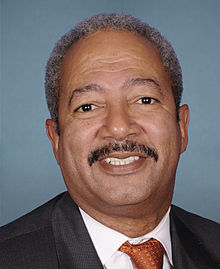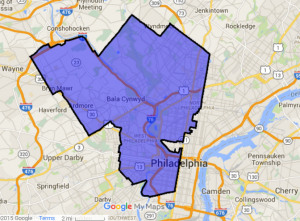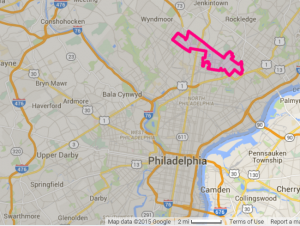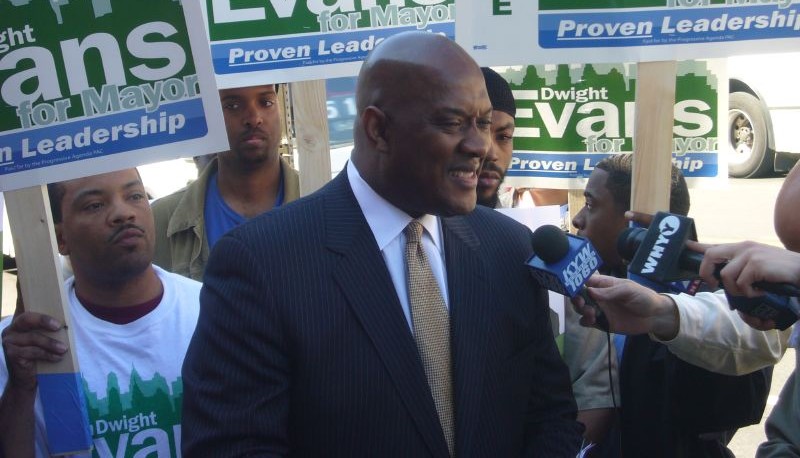This week Pennsylvania State Representative Dwight Evans announced he would seek the seat of recently indicted Congressman Chaka Fattah. The announcement came a day before Jim Kenney, a candidate Evans supported, was elected Mayor.
Fattah intends to run for re-election and is adamant that he will clear his name of all of the charges against him. He has a strong base in his district and has often run unopposed. His capacity to win this time, however, will be driven by public perception about his indictment and the challengers to his seat.
Congressman Fattah cannot be happy about the Evans announcement. In contrast to other announced candidates, Evans is a major player in the African American community and has a strong base of support in parts of Fattah’s Congressional District. The race just got really interesting.
The 2nd Congressional District is 60 percent African American, with large sections of West and Northwest Philadelphia, as well as parts of suburban Lower Merion. It is the third most reliably Democratic District in the nation, so once again the primary is the election.

Evans’ announcement sent the signal that the seat is in play. Moreover, the Representative from the Ogontz /West Oak Lane neighborhood is working on a political trifecta. He has been very skillful at the first two moves. This one is tougher.
In the first part of the trifecta, Evans supported candidate Wolf when he ran in the Democratic primary for Governor. He did this, despite the fact that there were three Philadelphia area candidates. One of them, Allyson Schwartz, was a Congresswoman Evans worked with when she was in the State legislature. Schwartz even has political connections in Northwest Philly, the traditional Evans stronghold. But those relationships were not enough for Evans to support her.
Evans came out for Wolf early and worked hard for him during the campaign. A good number of the Wolf transition team and several Wolf appointees have some Evans connection. To the victor go the spoils!
In part two of the trifecta Evans supported Jim Kenney’s candidacy (the Irish guy from South Philly) even though Tony Williams, a veteran African American candidate was in the race. Evans organized other African American leaders from the Northwest to support Kenney, and thus made it easier for some African Americans to pull his lever. To Kenney’s credit, he ran a nearly flawless campaign that made it easy to build a broad ethnic and interest group coalition.
In supporting Kenney, Evans took a chance on the fact that the usual racial math of the city was breaking down, at least in this election. He disappointed one time political ally Tony Williams, with whom he was once joined to the hip as part of the “gang of five”: Evans and Williams as Democrats, and Perzel, George Kenney, and John Taylor as Republicans. Together they pushed a bipartisan quality of life platform in the 1990’s, a reminder that the two parties in Harrisburg once worked together, at least on local issues.
In the case of Wolf and Jim Kenney, Evans claims he supported the best candidate as he saw it. Whatever we think of that claim, one thing is clear: He made the right call politically and it has served him well. Yesterday, Kenney named Evans co-chair of his transition team (along with Alba Martinez). He also has strong access to the Governor. He joins labor leader John Dougherty as one of the two most effective powerbrokers in town who are not named Bob Brady.
The Mayor-elect is his own man and will make his own personnel decisions but anyone who thinks certain high profile names and appointments will not be run past Dougherty or Evans has not been paying attention.
The third part of the Evans trifecta would be a successful run for Fattah’s congressional seat, a run supported most likely by the new Mayor, the Governor, and others looking for a way to jump off battleship Fattah. The problem is, the trial for Fattah will be starting at the time of the primary election in May and hence the outcome will not be known until after the primary.
If Fattah wins the election and then is convicted of the alleged racketeering charges, real political volatility erupts through an independent candidate or a special election, depending on the timing of the trial’s outcome.
So why take a chance on the congressional seat if you are Dwight Evans? His candidacy is bound to upset a good number of people who want to stand by Fattah. After all, things are good right now for Evans, so there is a lot of risk to his new brand, especially since he is ready to leave his Harrisburg seat after three decades.
Evans is attracted to the unexpected—like the early Wolf endorsement and the Kenney move. He is a natural outsider and disruptor, despite having built an effective inside political machine. Early on, he supported charter schools, data based policing strategies, and healthy food initiatives.
Moreover, if he wins the congressional seat, he starts from a position of weakness in terms of congressional committee assignments at a time when he is moving closer to the end than the beginning of his career. He will walk into unfamiliar territory and deal with new personalities not part of his existing political lane.
What is the rationale? I can think of a few things.
First, Harrisburg is not a good place to be right now, and it is hard to see it getting any better. After more than four months, there is no budget and the political standoff between a Republican-dominated legislature and a Democratic Governor will make it hard to get much done over the next few years. So this is not a bad time to get on Amtrak heading south. Washington will be in play in 2016 and there may be more potential for a political opening to do something. (Of course, you can make the counter argument that D.C. is every bit as dysfunctional.)
Secondly, Evans has run for Mayor twice and that is obviously no longer in the cards. Yet he has always wanted a bigger stage for his ideas than the District he represents. He views the District as his demonstration site for public policy. D.C. is certainly a bigger stage. The potential has to appeal to him.
Third, Evans is attracted to the unexpected, like the early Wolf endorsement and the Kenney move. He is a natural outsider and disruptor, despite having built an effective inside political machine. His career is filled with first mover initiatives, including early support for charter schools, data based policing strategies and the healthy food initiatives (Full disclosure: I worked with Evans on the food initiative when I was CEO of The Reinvestment Fund).
A run against Fattah brings all of these elements into play for the representative from Ogontz Avenue: a new stage, a bigger policy arena, and the unexpected. If he wins, his political status is elevated dramatically. He becomes a go to guy in Philly, Harrisburg, and D.C. all at once—not bad. If he loses, he can remain as an elder statesman in local politics or seek a different role in government.
The real intrigue here will play out with the existing Fattah allies in the state legislature and City Council, all of whom also have a relationship with Evans. Where do they go and whom do they support?
Today, Councilpersons Curtis Jones, Cindy Bass, Blondell Reynolds Brown and State Senator Vincent Hughes are part of the Fattah machine. But they don’t want to go down with a sinking ship. Nor do they want to be disloyal. It would be naive to think that Evans has not discussed this with many of those leaders.
There are other West Philadelphia politicians that will have some say: Senator Williams, who did not get support from Evans in the mayoral race, comes to mind, as does Councilwoman Blackwell, whose history with Fattah goes back to her husband’s defeat at the hands of Fattah two decades ago.
And let’s not forget how complex this district actually is: It straddles City Avenue into the suburbs, including parts of Lower Merion. It is a majority African American district but it has about a 30 percent white population as well. Both Fattah and Evans have traditionally done well crossing constituencies. Fattah has built those relationships as a congressman; Evans built them as the chairman of the House Appropriations Committee.
One way or the other, this could realign Philadelphia political allegiances. So if recent races bored you as a one party system posted North Korea-like percentages, stay tuned. This one may be a competitive brawl, of the old-fashioned kind.
Header Photo: Flickr/Dwight Evans for Mayor





